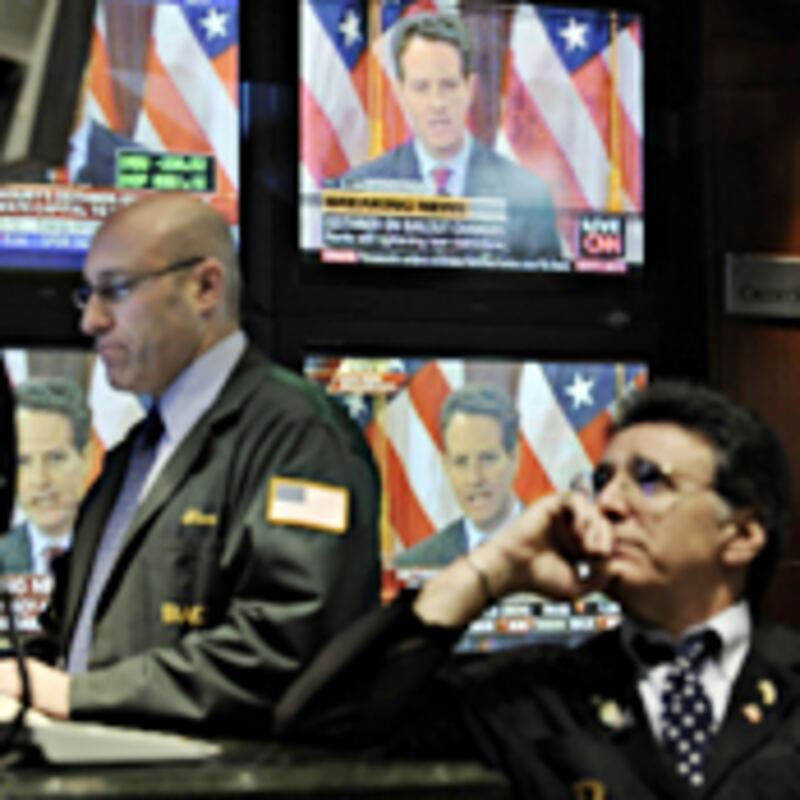
In response to Treasury Secretary Tim Geithner’s still-amorphous plan to prop up what remains of Wall Street, Treasury securities rallied yesterday and the Dow dropped nearly 400-points—a resounding thud if there ever was one. Perhaps the time has come for the Wall Street CEOs who will appear before Congress tomorrow to consider a much more radical proposition: You had your chance. Dispense with all the insipid government meddling and let the market decide what happens to Wall Street from this point forward.
It is no coincidence that the smaller, more-focused firms—the ones that are closer to their clients—are being flooded with resumes.
As much as I like and admire Secretary Geithner personally—failure to pay his taxes in a timely fashion aside—instead of trying to prop up the Potemkin village that was once known as Wall Street and using trillions of taxpayer dollars to do so, why not just say to the banks and securities companies that they have exhausted our largesse? There is another $350 billion left from the renamed Financial Stability Plan and those firms that can navigate their way out of these choppy waters (among them, perhaps, JP Morgan Chase, Morgan Stanley and Goldman Sachs) can carry on and those that cannot (perhaps, Citigroup and Bank of America/Merrill Lynch) shall suffer the harsh verdict of the market, with all of its attendant collateral damage.
Sure, this is a simplistic and potentially very dangerous bet, but propping up the system—through the injection of $350 billion of taxpayer money so far, and counting—has not exactly restored confidence in the financial system. Perhaps spending the remaining $350 billion will accomplish what the first $350 billion could not. But, if it doesn’t, why not let them live or die on their own?
The decision to let Lehman Brothers fail last year was a painful and controversial one—and it is now universally derided as among the worst economic decisions in a generation. And while Lehman’s shareholders, debtholders, creditors and thousands of former employees have all suffered greatly, that singular moment has been the only one in this entire crisis where market forces were allowed to play out free of the warping influence of the government. Unlike six months earlier when JP Morgan stepped in to buy Bear Stearns (albeit with $29 billion of government support), there was no viable entity willing to buy Lehman on Sunday, September 14, 2008. The government had made it clear that this time it wouldn’t step in. (The reasons why are still not entirely clear; perhaps some answers will be revealed before Congressman Barney Frank tomorrow.) Later that afternoon, Lehman was “mandated” to fail when former Treasury Secretary Henry Paulson informed Bart McGee, Lehman’s president.
The market got Paulson’s message loud and clear: Within hours, Merrill Lynch sold itself to Bank of America (which paid far too much for it) and then, within weeks, Morgan Stanley and Goldman Sachs converted themselves to bank holding companies and took in billions of dollars of new capital ($5 billion from Warren Buffett, in Goldman’s case, and $9 billion from Mitsubishi UFJ Securities, in Morgan Stanley’s) in an historic and decisive attempt to avoid the fate suffered by Bear Stearns, Lehman, and Merrill before them. Because Lloyd Blankfein, the CEO of Goldman Sachs, and John Mack, the CEO of Morgan Stanley, acted quickly and decisively, they lived to fight another day (and the stocks of their firms are up considerably since those dark days).
Unfortunately, no sooner had the message about Lehman been delivered and received, when Paulson et. al. bungled it again—for reasons that to this day remain cloudy at best—by proceeding to rescue AIG, Citigroup, Wachovia and then, as we have learned recently, the ill-fated Bank of America/Merrill Lynch merger.
The market is yearning for a clear and unambiguous message from the government. But Geithner did not give the market what it wanted. This is a complicated stew, no doubt about it. And the risks are large for making the wrong decisions. But the market can parse winners and losers if it is given the chance. Damn the “too-big-too-fail” or “too-important-too-fail” mantras. These big banks made terrible, terrible mistakes. Their management—not all of them, to be sure—made terrible errors in judgment over a long period of time.
They could have chosen to model themselves after Lazard Frères, a small firm that stayed focused on providing its clients with advice on M&A deals, on corporate restructurings and on how to manage its clients’ assets. Granted, Lazard did not make nearly as much money as Bear Stearns or Merrill Lynch over the years, but the company has paid its people very well and cost us taxpayers not a dime. Some banks did follow the Lazard model, among them Greenhill & Co. and Evercore. And every day, more firms are realizing that returning to what Wall Street is best at—providing its clients with the capital and the advice they want and need—is far preferable to the bloated, risk-intensive firms that have dominated Wall Street for the past 40 years and that have led us from one crisis to another. It is no coincidence that the smaller, more-focused firms—the ones that are closer to their clients—are being flooded with resumes.
The market is light years ahead of the government problem-solvers in sorting out this mess. Already, jobs are being slashed at the unsuccessful, universal banks, and pay has been reduced drastically. Bankers and traders are voting with their feet—to the safety of firms, like Lazard, that took far less risk. There is honestly no need for salary caps or whatever it is that Sen. Claire McKaskill is suggesting. Compensation has come way down on Wall Street and it will come down further and with far more accountability attached to the money that is paid out. Wall Street is returning rapidly to the way it used to be, when the partners were focused on their clients—not themselves—and the liability and profits were shared ratably.
The best thing that President Obama, Secretary Geithner, and Grand Poobah Larry Summers can do, at this point, is judiciously allocate the remaining $350 billion where it is most needed and let the cleansing process run its course, as calmly and as peacefully as possible.
Then get out of the way.
William D. Cohan, a former senior M&A banker on Wall Street, is the author of The Last Tycoons: The Secret History of Lazard Freres & Co. Cohan's House of Cards: A Tale of Hubris and Wretched Excess on Wall Street, will be published by Doubleday in 2009.





